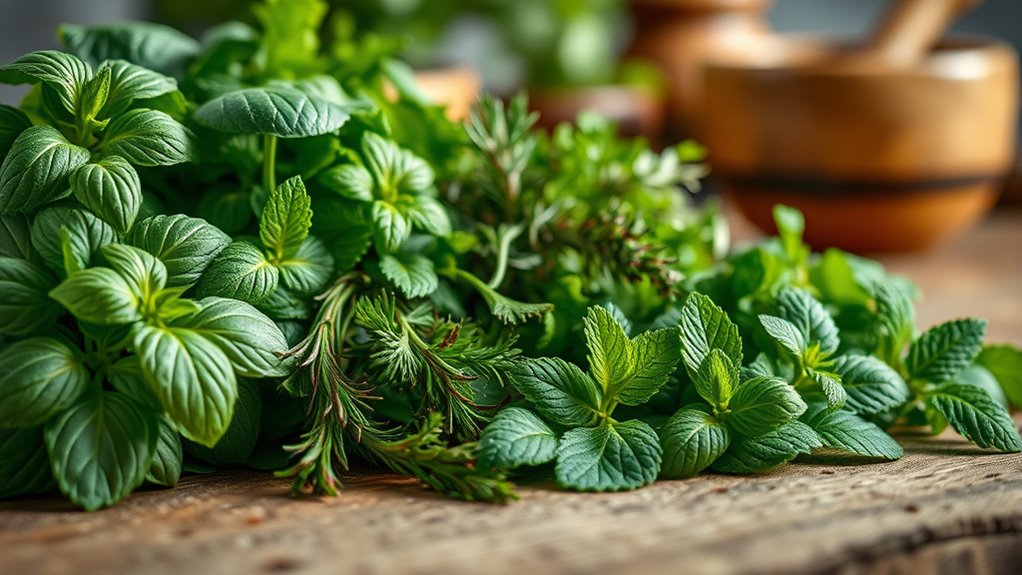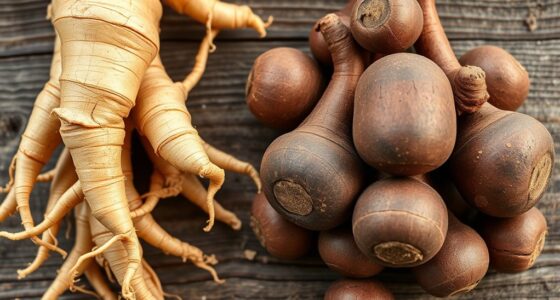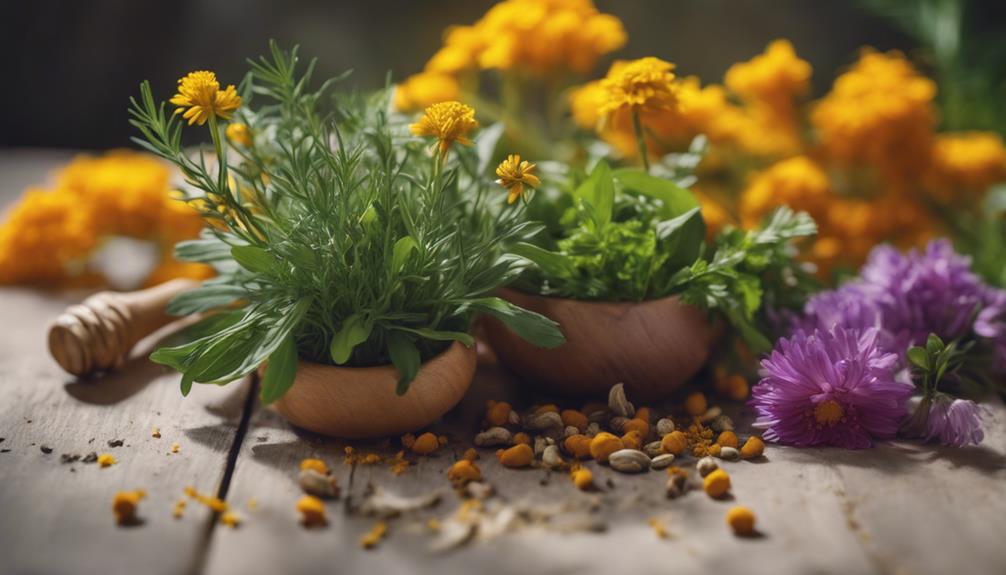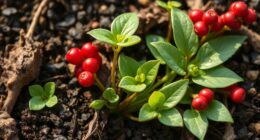To fight chronic tiredness, incorporate adaptogenic herbs like ashwagandha and holy basil into your routine, as they help your body manage stress and boost stamina. Try herbal teas infused with these herbs or energizing options like ginseng and rhodiola to improve alertness and focus. Regular use supports your immune system, circulation, and overall vigor. Keep exploring natural solutions, and you’ll discover more ways to transform fatigue into everyday energy.
Key Takeaways
- Adaptogenic herbs like ashwagandha and holy basil help regulate stress and restore energy balance over time.
- Ginseng and Rhodiola boost mental clarity, circulation, and combat fatigue for sustained physical and mental vigor.
- Herbal teas infused with adaptogens provide gentle, caffeine-free energy support and stress reduction.
- Incorporating herbs into daily routines through infusions or supplements can strengthen immune health and reduce tiredness.
- Combining herbs with flavors like ginger and cinnamon enhances energy, immunity, and overall vitality naturally.
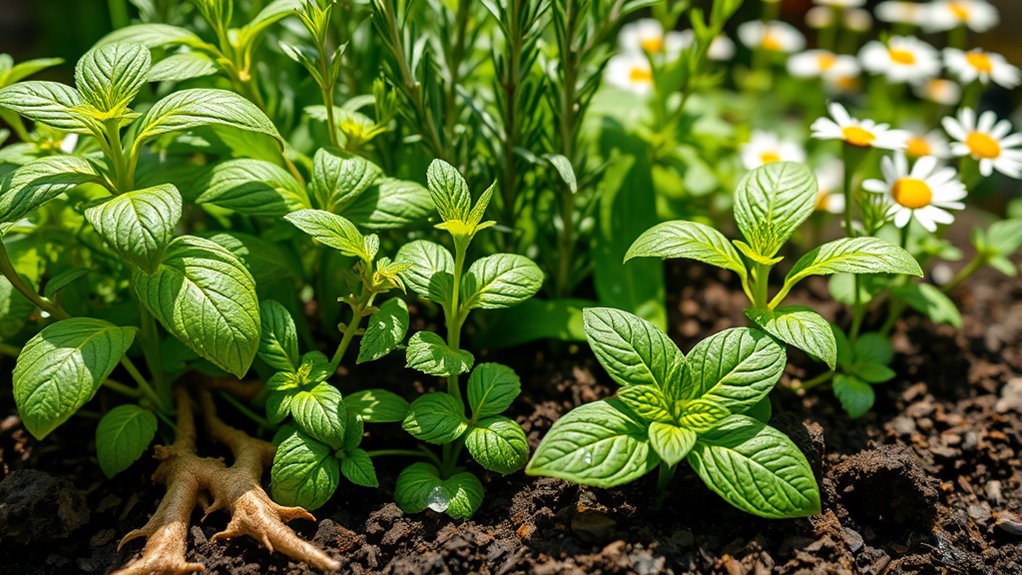
If you’re battling chronic tiredness, herbs can be a natural way to boost your energy levels. Many people turn to adaptogenic herbs, which are known for helping your body adapt to stress and restore balance. These herbs work by supporting your adrenal glands, reducing fatigue, and increasing stamina over time. Incorporating adaptogenic herbs into your daily routine doesn’t have to be complicated — herbal teas are an easy and enjoyable way to do so. Sipping a warm cup of herbal tea infused with adaptogens like ashwagandha or holy basil can provide a gentle, sustained energy boost without the crashes associated with caffeine. These teas not only hydrate you but also deliver potent herbal compounds that help regulate your body’s stress response, making you feel more resilient and less drained.
You might also consider herbal teas with ginseng, which has long been used to enhance physical and mental vigor. Ginseng stimulates circulation and improves oxygen flow, helping you feel more alert and focused. Drinking ginseng tea regularly can combat feelings of sluggishness, especially during those mid-afternoon slumps. Another effective herbal tea is rhodiola, an adaptogenic herb known for its ability to fight fatigue and improve mental clarity. When you start your day with a cup of rhodiola tea, you set a foundation for sustained energy, reducing the need for sugar or caffeine to keep going.
Beyond teas, adaptogenic herbs come in supplement form, but incorporating them into your diet as herbal infusions makes it easier to benefit from their properties without overdoing it. You might find that making your own herbal teas with adaptogenic herbs is both cost-effective and customizable. Add a few slices of fresh ginger or a dash of cinnamon for extra flavor and health benefits. These combinations not only taste great but also support your immune system and circulation, providing a holistic approach to battling fatigue.
Frequently Asked Questions
Are Herbal Remedies Safe for Long-Term Use?
You might wonder if herbal remedies are safe long-term. While many herbs have traditional medicine credibility, it’s crucial to take into account herbal ingredient interactions that could cause issues over time. You should consult with a healthcare professional before using herbs long-term, especially if you’re on medication. Proper guidance helps ensure that herbal remedies support your health safely without adverse effects, making your journey from fatigue to vitality more effective.
Can Herbs Replace Prescribed Fatigue Medications?
Thinking herbs can replace prescribed fatigue meds is like trying to steer a ship with a paper rudder. While herbs may boost energy, they can’t always handle complex conditions or herb interactions. You need to take into account dosage considerations and consult a healthcare professional, especially to prevent adverse effects. Herbs can complement treatments, but they shouldn’t replace prescribed meds without proper medical guidance.
Do Herbal Treatments Have Any Known Side Effects?
Herbal treatments can have side effects, especially if you’re not aware of herbal interactions or dosage concerns. You might experience allergic reactions or unwanted interactions with medications. It’s essential to follow recommended dosages and consult a healthcare professional before starting any herbal remedy. Staying informed helps you avoid adverse effects, ensuring you safely benefit from herbs that can boost your energy and overall well-being.
Which Herbs Are Best for Severe Chronic Fatigue?
Imagine you’re in a time machine, and you find adaptogenic herbs that can help with severe chronic fatigue. These herbs, like rhodiola and ashwagandha, boost your energy and resilience. Herbal teas made from ginseng or holy basil can also support your recovery. Incorporate these natural remedies into your routine, and you might just regain your vitality and push back fatigue’s grip—no need for a knight’s quest, just simple, effective herbs.
How Quickly Can I Expect Herbal Remedies to Work?
You might notice improvements within a few days to a couple of weeks, depending on your herbal preparation methods and natural supplement sourcing. Consistency is key; taking herbs regularly enhances their effectiveness. While some herbs act quickly, others need more time to build up in your system. Keep track of your progress and consult a healthcare professional to tailor your herbal approach for ideal results.
Conclusion
So, next time your energy dips, consider gently inviting nature’s helpers into your routine. These herbs may softly lift your spirits and restore your zest, guiding you back to your vibrant self. With a touch of patience and care, you can turn those lingering shadows of fatigue into a gentle dawn of renewed vigor. Embrace these botanical allies, and let each day become a little brighter, a little lighter, and a little more alive.

